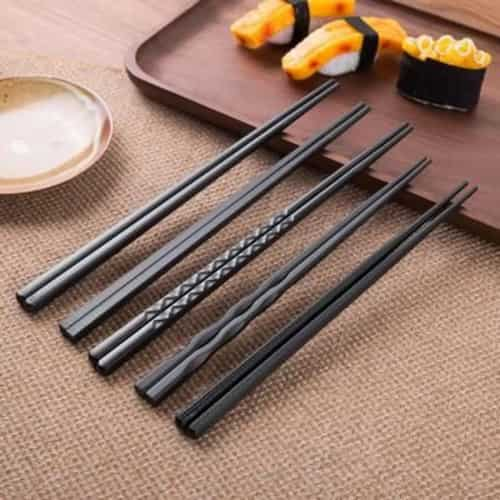The food and culture of China, Japan and Korea have influenced people all around the world, and one of the most notable culinary influences is the use of chopsticks. Chopsticks have a long history in Asia. It has been estimated that they're over 5000 years old. They originated in China and spread to Japan and Korea by 500 A.D.
Chopsticks are pairs of equal-length sticks that are widely used as eating utensils in Asian countries. They have become standard cutlery in Asian culture and restaurants all around the world, whether you know how to use them correctly or not. They can be used to eat the whole meal or only portions of it.
Did you know that Chinese chopsticks differ from those used in Japan and Korea?
Chinese chopsticks
Chopsticks in China are long and blunt at the ends. In reality, they are longer and thicker than other countries' chopsticks. Food was historically served on a spinning platform in the centre of the table in Chinese cuisine. To make it easier to reach the meal, the chopsticks are longer. They normally measure 25 centimetres in length and have circular sides. They are said to be extensions of one's fingers. Wood is commonly used, although the material used will vary depending on the components. All Chinese chopsticks, on the other hand, are designed to pick up little things like beans or rice. These chopsticks are easier to use because of their tapered ends.

Korean chopsticks
In comparison to Chinese and Japanese chopsticks, Korean chopsticks are of medium length. Furthermore, metal chopsticks are used in traditional Korean cuisine. For those who have never used chopsticks before, they can be challenging. Silver chopsticks were traditionally used by the higher classes. Stainless steel is commonly used in modern Korean chopsticks. Stainless steel chopsticks are also heavier than traditional chopsticks. It is easy to clean and more hygienic because it is made of metal. They have a flat design and are built to last. Koreans also use a huge metal spoon in addition to chopsticks, so eating rice or soup is not a problem.

Japanese chopsticks
Both Chinese and Korean chopsticks are shorter than Japanese chopsticks. When eating, the Japanese hold their bowls close to their mouths, leaving little space between mouth and food. As a result, Japanese chopsticks are typically shorter. They have a rounded tip as well. Furthermore, its wooden texture makes it simpler to hold sticky rice. In addition, the location of Japanese chopsticks differs. To accommodate their eating habits, which include eating from bento boxes and platters, the Japanese place their chopsticks horizontally to their meal. Women's chopsticks are often shorter, and children's chopsticks are much shorter.

The length of Chinese, Korean and Japanese chopsticks is the biggest distinction. The longest chopsticks are Chinese, while the shortest are Japanese. In comparison to Chinese and Japanese chopsticks, Korean chopsticks are of medium length.


